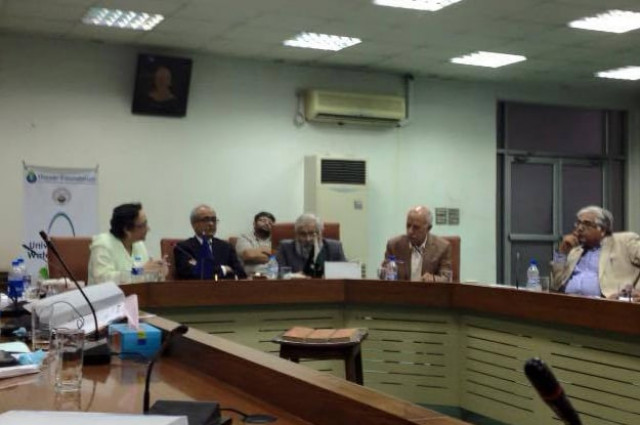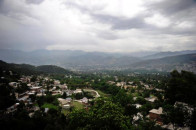Dire straits: ‘Water scarcity must top govt’s agenda’
Pakistan loses 35 million acre feet of water each year

Two day meeting of the members of the UWN to discuss the future needs of Pakistan's water sector and to take the research agenda of the Think Tank forward. PHOTO: fb.com/hisaarfoundation
The seminar titled Integrated Water Resources Management: Opportunity and Challenges, was arranged by the Water Management Research Centre and Department of Irrigation and Drainage, University of Agriculture Faisalabad’s New Senate Hall.
Hisaar Foundation Think Thank Chairperson Mirza Qamar Baig said the world was facing challenges regarding water scarcity in the wake of climate change. One of the major socioeconomic challenges was the mismanagement of water resources. He stressed the need to bridge the communication gap between researchers and policy makers so the issue could be resolved at a national level.
He called the development of cohesive and sustainable economic, social and political strategies. “There is no life without water…it is necessary for irrigation, food security, economic growth, energy production, industrial growth and population health.”
Faculty of Agricultural Engineering Dean Allah Buksh said it was a matter of grave concern that flood water drained into the sea. He stressed the need to set up dams to conserve the water.
He said, “We are facing a 20 per cent water shortfall. And yet no dam has been constructed in the last 40 years. India is in the process of building 150 dams.”
Hisaar Foundation Think Thank Convener Simi Kamal said the time was ripe for the promotion of rational use of water across the country. “We need to save our future generations from drought.”
ORIC Director Prof Dr Asif Ali said per capita water availability in the country had declined from 5,000 cubic metres per annum at the time of the Partition to 900 cubic metres per annum.
He said the country’s agronomic pattern had gone haywire due to climate change. “Joint efforts on the part of researchers, policy makers and other stakeholders to address that are need of the hour.”
Dr Akhtar Abbas from Australia said water scarcity was a real challenge for the developing world. He said the Murray-Darling Basin in Australia provided water for irrigation to 65 per cent of arable land in Australia. He said effective water conservation methods must be adopted in Pakistan.
Dr Zohair Ashar said the water use paradigm was changing in Pakistan. He said the political leadership needed to place it on the top of their agenda. He said a nexus of industry, researchers and policymakers was necessary to deal with the issue.
Dr Sarosh said, “We lose 35 million acre feet of water each year.” He said in Balochistan, more than 18 large tube wells had been installed. He said the quality of underground water was deteriorating as a result of pumping at an unsustainable rate.
Published in The Express Tribune, October 20th, 2015.



















COMMENTS
Comments are moderated and generally will be posted if they are on-topic and not abusive.
For more information, please see our Comments FAQ